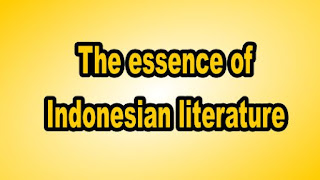The essence of Indonesian literature
Literature comes from the Sanskrit shastra language, which means "writing that contains instructions or guidelines". Literary understanding refers to the word literature which has an impact on ness. "Su" means good or beautiful and "literature" means writing or painting. So, literature means painting or writing that contains goodness or beauty. (Rosdiana, n.d.) Literature is divided into oral and written. Literature is related to all kinds of written works. While oral literature or what is known as folklore is a literary work which is expressed directly or verbally. In the discussion of literature, there are literary and literary terms. The writer is the author or creator of the literary work. While literary refers to literary works that are more poetic and abstract. (Ahmad, 1984)
When discussing literature, what comes to our mind is the beauty of language. Literature has linguistic elements that contain high aesthetic values. Literary language is also used as a means of communication to convey information with high feelings to the audience or the reader. The beauty aspects of literary works can be viewed in different terms, namely, in terms of language and beauty itself (Istiqomah & Doyin, 2014)
In the Big Indonesian Dictionary (KBBI), literature is defined as the language (words, style of language) used in books (not everyday language). Therefore, literature is not commonly used in everyday life. Therefore the language of literature is not a language of conversation that is simple and easy to understand, in this case the ancient literature that uses standard rules and rigid patterns. Whereas free literature or ordinary prose uses simple language patterns and structures that are more free. Literary language has a depth of meaning because it is often used to express feelings or convey moral messages and virtue values. Certainly this underlies the properties and functions of the literary meaning itself. That is:
1. Functional recreation. Literature serves as a means of entertainment for readers because it contains elements of beauty.
2. Didactic function which contains the teaching function because it is educational with elements of goodness and truth.
3. Which function of morality contains moral values that explain about good and what is bad and what is wrong and right.
4. Religious function. Literature is able to give religious messages to its readers. (Yanti, 2015)
Literature is a universal form of culture with creative art products whose object is human and all its problems and is conveyed or contained by a unique language and contains aesthetic value. In addition, literary works are a product of imagination and creativity of the author himself (Eka et al., 2007)
Based on the notions of literary works, it can be concluded that literary works are human works in the form of language that represent social phenomena because they are related to the reader and aspects of human life expressed in them.
Reading literary works also has a purpose, including:
1. To utilize knowledge. Literature contains knowledge because it contains the experiences and lives of the authors. However, knowledge gained from literature is not intended to enrich knowledge about a thing. However, it aims to animate and utilize the knowledge possessed.
2. To enrich spiritually. Some literary works have a figure that contains a very deep meaning. The reader is made to participate to look for a meaning contained on the surface of the story so that the reader will find spiritual wealth tucked between literary poems.
3. To become a civilized human being. By reading literary works, the reader will indirectly be led to explore the variety of ways and cultures spread by the author. Called humans who are cultured if it has a fast and responsive attitude in all things noble and beautiful in this world.
To learn to express something good. Literature is full of good words and beautiful. This indirectly makes the reader trained to express the utterance with a beautiful and interesting language style for certain purposes.
